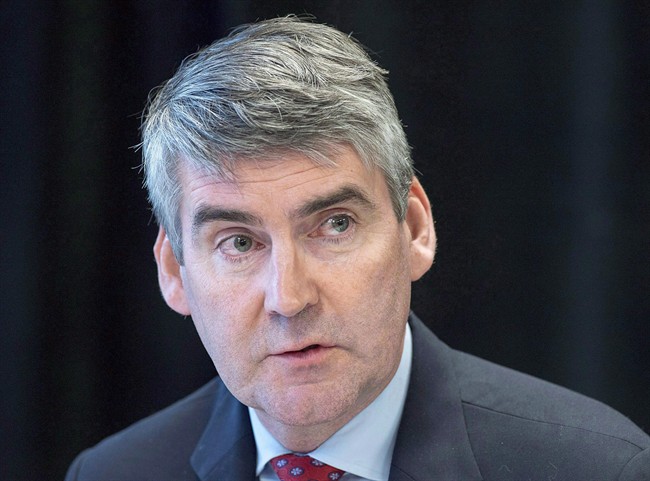If federal officials are looking for innovative ideas about how to better deliver health care, they should look to the Atlantic region, Nova Scotia Premier Stephen McNeil suggested Friday, saying important lessons could be learned from some of the novel approaches his province has already adopted.

READ MORE: More safety, security protocols coming to Nova Scotia emergency rooms
McNeil made the pitch Friday, after federal Health Minister Jane Philpott held a series of closed-door meetings in Halifax with provincial officials.
“The federal minister, I know, is very passionate about (innovation),” McNeil said after a health-care announcement.
“When I talk to the prime minister and to the health minister about the health-care (funding) accord, I’m trying to encourage the national government that Atlantic Canada is a great health incubator, where we should be looking at innovation.”
Philpott did not appear at any public events in Nova Scotia, and she declined a request for an interview Friday.
READ MORE: Nova Scotia getting more health dollars in side deal with Ottawa: minister
McNeil confirmed Philpott was in Nova Scotia to talk about the province’s decision last month to join New Brunswick and Newfoundland and Labrador in signing bilateral health-care funding agreements with Ottawa. Those agreements included targeted funding for mental health and home care.
- Canada’s dental plan has officially kicked in. Who is eligible?
- Mandatory breath samples now required in every Toronto-area traffic stop: OPP
- Tories grill Liberals in question period about minister’s ties to lobbyist, PPE company
- N.S. mother ‘in shock’ after enduring 17-hour hospital wait with sick baby
Nova Scotia Health Minister Leo Glavine said Philpott was given a detailed briefing about the province’s latest initiatives in those two areas.
He said Philpott was keenly interested in a new provincial program that has advanced-care paramedics providing palliative care – including medications for anxiety and pain – to patients in their homes.
“That’s an area that we want to expand across the province,” Glavine said in an interview.
“(Philpott) sees this as one of those advanced practices that other provinces could (use) … to improve home-care across the country. She was totally impressed.”
As well, Glavine said Philpott learned about the province’s Bloom program, which has a growing number of Nova Scotia’s pharmacists providing basic mental-health services and counselling to people with mental challenges and addictions. So far, about two dozen of the province’s 300 pharmacies are taking part in the program.
READ MORE: Justin Trudeau mis-remembers health funding platform promise
“We have to move past everybody flocking to Halifax for service,” Glavine said.
As for the province’s decision to sign a health-care funding deal with Ottawa, Glavine said the province was not offered any inducements to agree to the federal government’s terms.
Earlier this week, Saskatchewan and all three territories signed their own deals with Ottawa, further fragmenting what was once a united front opposed to a new funding formula.
Late last month, the federal government offered to increase health transfer payments by 3.5 per cent annually and fork out another $11.5 billion over 10 years in targeted funding, primarily for home care and mental health.
READ MORE: Nova Scotia, New Brunswick split on Ottawa’s cash for health care offer
All the provinces and territories initially rejected the offer, only to see their united front splinter within days, as jurisdictions with smaller populations signed side deals – P.E.I. being one exception.
The remaining provinces, which represent 90 per cent of the Canadian population, are standing by their demand for federal health transfers to grow by 5.2 per cent each year. They are also calling on Prime Minister Justin Trudeau meet with the premiers to discuss health funding.
The provinces have been receiving six per cent annual increases in federal health transfers for over a decade.
For the provinces that have signed deals, that rate will fall to either three per cent or the three-year moving average of nominal GDP growth, whichever is higher, as of April
Philpott has said Ottawa wants to transform the system because health-care outcomes in Canada are average compared to similar countries – even though Canadians pay some of the highest per-capita costs in the world.



Comments